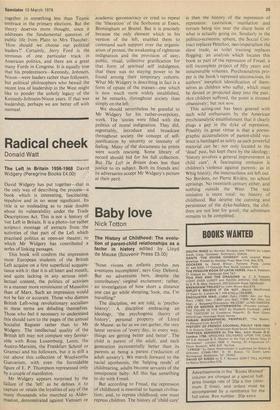Baby love
Nick Totton The History of Childhood: The evolution of parent-child relationships as a factor in history edited by Lloyd de Meuse (Souvenir Press £5.00)
'Nous vivons en enfants perdus nos aventures incompletes', says Guy Debord. But no adventures here, despite the contributors' virginal excitement; rather, an investigation of how short a distance one can go while shouting, 'look, ma, I'm travelling!'
The discipline, we are told, is 'psychohistory'. A discipline embracing an ideology, 'the psychogenic theory of history', personal property of Lloyd de Mause: as far as we can gather, the very latest version of 'every day, in every way, things are getting better and better'. The child is parent of the adult, and each generation incrementally better than its parents at being a parent ('reduction of adult anxiety'). We march forward to the racial apotheosis, the 'helping mode' of childrearing, adults become servants of the omnipotent baby. All this has something to do with Freud.
But according to Freud, the repression of childhood is essential to human civilisation; and, to repress childhood, one must repress children. The history of 'child care'
is then the history of the repression of repression: castration, mutilation and torture being too near the sharp bone of what is actually going on. Similarly in the politico-economic sphere, the Social Contract replaces Peterloo, neo-imperialism the slave trade, as toilet training replaces flogging: an analysis which locates this book as part of the repression of Freud, a still incomplete project of fifty years and innumerable volumes. Psychoanalysis proper is the book's repressed unconscious, its authors' inexplicit identification of themselves as children who suffer, which must be denied or projected deep into the past; then children suffered, the point is stressed obsessively; but not now.
This acting-out has been greeted with such wild enthusiasm by the American psychoanalytic establishment that it clearly plugs a gap in the dyke of repression. Possibly its great virtue is that a pornographic accumulation of parent-child violence is bandaged as safely as such powerful material can be: not only located in the 'dead' past, but kept there by the ideology: 'history involves a general improvement in child care'. A fascinating omission is children's violence against parents; as in Whig history, the insurrections are left out. No Bordens, no Pierre Riviere, no school uprisings. No twentieth century either, and nothing outside the West. The real omission is more total: no history of childhood. But despite the cunning and persistence of the dyke-builders, the children are not lost for good; the adventure remains to be completed.


































 Previous page
Previous page